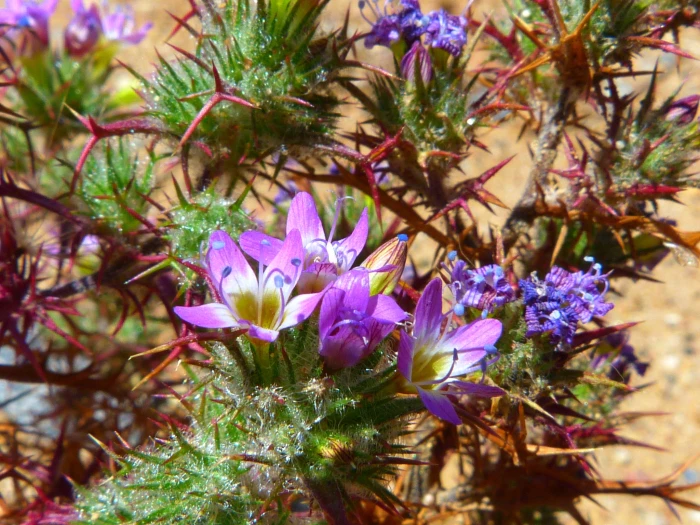Hooked Pincushionplant
(Navarretia hamata)
Hooked Pincushionplant (Navarretia hamata)
/
/

Zack Abbey
CC BY 4.0
Image By:
Zack Abbey
Recorded By:
Copyright:
CC BY 4.0
Copyright Notice:
Photo by: Zack Abbey | License Type: CC BY 4.0 | License URL: http://creativecommons.org/licenses/by/4.0/ | Rights Holder: Zack Abbey | Publisher: iNaturalist | Date Created: 2017-05-20T10:58:45-07:00 |
























Estimated Native Range
Climate Requirements for Whitney, Nevada
| This Plant | Your Site | Plant Suitability for Your Location | ||
|---|---|---|---|---|
| • Precipitation | 7" - 38" | 4" | Your precipitation may be insufficient for this plant. Irrigate N" / year. | Irrigate N" / year |
| • High Temp. | 71°F - 98°F | 106°F | Your summers may be too hot for this plant. | Too hot |
| • Low Temp. | 22°F - 49°F | 36°F | Your winter temperatures are normal for this plant | Excellent |
This plant should grow well at your location with about N inches per year (Y minutes per month) of irrigation.
Summary
Navarretia hamata, commonly known as hooked pincushionplant, is a hairy, glandular annual herb that thrives in the chaparral, coastal sage scrub, and open grasslands of California and Baja California. Its range extends from the Monterey Bay area, through the Central Coast, to the lower slopes of the Transverse Ranges and Peninsular Ranges, coastal mesas in Southern California, and includes three of the Channel Islands, as well as regions south into Baja California. The plant typically grows up to 12 inches tall and is characterized by its strong skunky scent. Hooked pincushionplant has leaves divided into narrow, sharp-tipped lobes, and its pink or purple tubular flowers measure up to 0.6 inches long, blooming from April to July. The inflorescence is a head filled with leaflike green bracts, which can be quite showy when in full bloom.
In cultivation, Navarretia hamata is valued for its unique appearance and the vibrant color of its flowers, which can add interest to native plant gardens and wildflower meadows. It is relatively easy to maintain, requiring minimal care once established. This plant prefers full sun to part shade and well-drained soils, and it is drought-tolerant, making it suitable for xeriscaping. While not commonly used in traditional garden settings, it can be an intriguing addition for those looking to create a natural, California-native landscape. However, gardeners should be aware that its strong scent may be considered unpleasant by some.CC BY-SA 4.0
In cultivation, Navarretia hamata is valued for its unique appearance and the vibrant color of its flowers, which can add interest to native plant gardens and wildflower meadows. It is relatively easy to maintain, requiring minimal care once established. This plant prefers full sun to part shade and well-drained soils, and it is drought-tolerant, making it suitable for xeriscaping. While not commonly used in traditional garden settings, it can be an intriguing addition for those looking to create a natural, California-native landscape. However, gardeners should be aware that its strong scent may be considered unpleasant by some.CC BY-SA 4.0
Plant Description
- Plant Type: Herb
- Height: 0.3-0.5 feet
- Width: 0.5-1 feet
- Growth Rate: Moderate
- Flower Color: Pink, Purple, White, Yellow
- Flowering Season: Spring, Summer
- Leaf Retention:
Growth Requirements
- Sun: Full Sun
- Water: Medium
- Drainage: Medium
Common Uses
Bee Garden, Low Maintenance, Water Garden
Natural Habitat
Chaparral, coastal sage scrub, and open grasslands
Other Names
Common Names: Hooked Pincushionplant
Scientific Names: Navarretia hamata
GBIF Accepted Name: Navarretia hamata